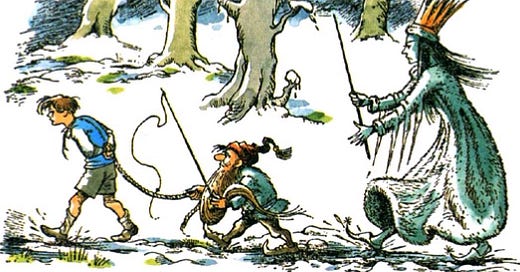Inspiration of “Aslan Is Nearer”
While Edmund’s siblings faced a difficult and potentially dangerous journey in the previous chapter, they encountered Father Christmas and received gifts. Edmund’s time with the witch, on the other hand, was “disappointing.” He doesn’t get the lavish welcome. There are no rooms of Turkish delight. Despite all that, he continues to expect her mood toward him to change, but she never views him as something other than a tool for her own purposes.
In his darkest moment, Edmund suddenly starts to see the light. Without a coat in the cold and snow, the sledge ride with the witch is “terrible” and “miserable.” He can no longer deny the type of person she is. He hears her tell Maugrim the wolf to kill everyone at the Beavers’. The rationale he had used to convince himself that she was good and kind sounded “silly” to him. He wanted to get away from her and meet his brother and sisters.
In his darkest moment, Edmund suddenly starts to see the light.
If he needed further evidence of her cruelty, that comes as she stops her sledge. He’s hoping for breakfast, but instead of providing a meal, she ruins one. A group of animals and mythical creatures were having a feast with gifts left by Father Christmas. Despite their deference to the witch, she demands they recant their story. When one squirrel refuses to lie and asserts Father Christmas had in fact been there, she turns the whole party into stone.
As she’s doing this, Edmund instinctually calls out, “Oh, don’t, don’t, please don’t.” She slaps his face for asking “favor for spies and traitors.” But amid his own pain, we get a pivotal line: “And Edmund for the first time in this story felt sorry for someone besides himself.” His empathy extends to those who, like Lucy earlier when confronted about the truthfulness of Narnia, refused to lie even when no one believed them and even if cost them something.
The change in Edmund mirrors the change in Narnia. As his heart begins to thaw so does the landscape around him. For the first time since he stepped through the wardrobe, Edmund sees green trees and colorful flowers in Narnia, hears streams running and birds singing, and feels a gentle breeze and warm sunshine.
The change in Edmund mirrors the change in Narnia. As his heart begins to thaw so does the landscape around him.
For Edmund these changes bring hope and joy, though he hardly knows why, but for the witch and dwarf, these signal trouble. The dwarf recognizing this is no longer merely a thaw. “This is Spring,” he says. “What are we to do? Your winter has been destroyed, I tell you! This is Aslan’s doing.” The Witch threatens both the dwarf and Edmund with death if they ever mention that name again, but it’s too late. As the chapter title reveals, “Aslan is nearer.”
Keep reading with a 7-day free trial
Subscribe to The Wardrobe Door to keep reading this post and get 7 days of free access to the full post archives.





